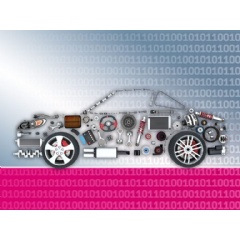Environmentally friendly and profitable: Germany’s largest car recycler LRP relies on Catena-X and T-Systems
- T-Systems develops solution to connect small and medium-sized enterprises to Catena-X infrastructure
- Transparent supply chains improve recycling of end-of-life vehicles
- Uniform data formats ensure greater efficiency
Is it worth buying a car? How profitable is recycling? A question that the employees of LRP Autorecycling ask themselves about 20,000 times a year. To make a reliable assessment, they need precise information about which components and materials are installed in the vehicle. This is information that is not yet available at the push of a button.
Creating more transparency in the value chain is one of the goals of the Catena X Automotive Network. The participating companies of the Catena X network pursue the vision of creating a data ecosystem for the automotive industry, in which companies of the entire value chain are connected. However, in order for companies to “dock on” to the data ecosystem, the various IT systems must be compatible with each other. T-Systems has developed a connection and integration solution to connect small and medium-sized enterprises (SMEs) to data spaces, such as Catena-X. “It is important to us to accompany our customers on the path to digitisation in a future-proof and reliable way. To make their IT systems ’connectable’,” says Dr Andreas Greis, Senior Vice President Digital Solutions, T Systems. “Certified and standardised solutions are essential. To ensure this, we are working on the development of these standards as a data room pioneer. Therefore we are a member of the Gaia-X European Association for Data and Cloud AISBL, the International Data Space Association as well as the Catena-X Automotive Network e.V.”
What’s inside the car?Why is transparency in the value chain so important? There are few products that are as individually assembled as a car. A new car consists of an almost unique combination of components. The employees of LRP, Germany’s largest car recycler, cannot see at first glance which parts and materials are built into a used car. This makes it all the more complicated when it comes to recycling. Is it economical to dismantle and sell individual components? Or does only disposal make sense? Up to now, this decision has been based on self-generated lists and information from a multitude of different databases.
This is where the added value of the Catena-X data ecosystem comes into play: in the neutral network, users such as LRP find standardised and trustworthy data with information along the entire automotive value chain - from the first screw to the complete vehicle.
Standardisation for more transparencyStandardisation and transparency are the solution to the problem. Because with every individually configured vehicle, the components are also provided individually from the automotive manufacturer’s supplier ecosystem. Each of these suppliers uses its own processes and IT systems. The data from these different systems are often not compatible with each other. Components and parts have different, company-specific identifiers, in different data formats.
But how can these different information worlds be brought together? The aim of Catena X is to make data available in future via jointly defined, standardised interfaces. An integration solution from T Systems makes it possible for companies to extract data from their systems and then make it available on platforms such as Catena-X.
With a special module for the T-Systems product “PDM WebConnector”, T Systems now provides a solution to connect companies’ enterprise resource planning systems to the future Catena-X infrastructure. The solution has been specifically developed for small and medium-sized enterprises (SMEs). The required exchange data of LRP-Autorecycling will then automatically be adapted to the Catena-X data models and transferred to the platform. In turn, the data flows back interoperably to the merchandise management system. In future, it will be possible to access the data of the member companies in a standardised form via the Catena-X platform. Who can access which data and how is precisely regulated. Keyword: data sovereignty.
Digital twin as data manager“Digital twins“ help with the implementation. Digital copies of each individual vehicle or its components. However, a complete, virtual image of the supply chain only emerges when data from different companies flow together. The information provided via digital twins from the respective suppliers and other stakeholders in the supply chain can be brought together by the Catena-X data ecosystem. Only then does it become transparent which supplier has produced which component. Where he sourced the parts and raw materials from. Which repairs were carried out over time. And which parts have been newly installed.
Technically, the solution envisages that a ”data container“ will be created at each stage of the production value chain. These ”containers" are registered centrally in the data ecosystem. The specifications of the data ecosystem regulate the exchange of data. The actual data remain in the systems of their owners. For the employees of LRP, this means that they only have access to information about which components are installed or which pollutants are contained in components. This ensures data sovereignty for all parties involved. The time-consuming, manual comparison with various data sources is no longer necessary. Based on this data, LRP can make a much more reliable decision on whether the purchase of a vehicle is of interest to them. By simply adapting the configuration, the solution can also be used for other companies and their IT systems.
The Catena-X Automotive Network relies on as many companies as possible integrating their data in the ecosystem and thus making a broad database available. For this reason, the Catena-X network is also explicitly aimed at small and medium-sized companies. Only if they participate will the sovereign data space unfold its full potential and advance digitisation throughout the automotive industry.
About Deutsche Telekom: Deutsche Telekom at a glance
( Press Release Image: https://photos.webwire.com/prmedia/6/291867/291867-1.jpg )
WebWireID291867
This news content was configured by WebWire editorial staff. Linking is permitted.
News Release Distribution and Press Release Distribution Services Provided by WebWire.
